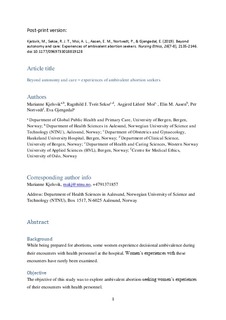| dc.contributor.author | Kjelsvik, Marianne | |
| dc.contributor.author | Sekse, Ragnhild Johanne Tveit | |
| dc.contributor.author | Moi, Asgjerd Litleré | |
| dc.contributor.author | Aasen, Elin Margrethe | |
| dc.contributor.author | Nortvedt, Per | |
| dc.contributor.author | Gjengedal, Eva | |
| dc.date.accessioned | 2020-02-10T15:38:34Z | |
| dc.date.available | 2020-02-10T15:38:34Z | |
| dc.date.created | 2019-02-13T09:42:02Z | |
| dc.date.issued | 2019 | |
| dc.identifier.citation | Nursing Ethics. 2019, 26 (7-8), 2135-2146. | nb_NO |
| dc.identifier.issn | 0969-7330 | |
| dc.identifier.uri | http://hdl.handle.net/11250/2640874 | |
| dc.description.abstract | Background While being prepared for abortions, some women experience decisional ambivalence during their encounters with health personnel at the hospital. Women’s experiences with these encounters have rarely been examined. Objective The objective of this study was to explore ambivalent abortion-seeking women’s experiences of their encounters with health personnel. Research design The data were collected in individual interviews and analysed with dialogical narrative analyses. Participants and research context Thirteen women (aged 18-36 years), who were uncertain of whether to terminate their pregnancies during the first trimester, were interviewed before and after they made their decisions. The participants were recruited at six Norwegian outpatient clinics. Ethical considerations Approval was granted by the Regional Committee for Medical and Health Research Ethics. Findings The ambivalent pregnant women sought to make autonomous decisions while simultaneously involving their closest confidants and health personnel in the process. The following three types of narratives of women’s experiences with encounters with health personnel were identified: the respected women, the identified women and the abandoned women. Discussion The findings are discussed in terms of the ambivalent pregnant woman’s autonomous responsibility in considering an abortion and how her autonomy can be enabled or impaired during encounters with health personnel. Conclusion and implication Although the women considered themselves autonomous and responsible for their final decisions, they wished health personnel were involved in their situations. The health personnel contributed by enabling or disabling the possibility of decision-making in accordance with the women’s values. The findings indicate that health personnel who care for women considering abortions must be trained in dialogical competence. | nb_NO |
| dc.language.iso | eng | nb_NO |
| dc.publisher | SAGE Publications | nb_NO |
| dc.title | Beyond autonomy and care: Experiences of ambivalent abortion seekers | nb_NO |
| dc.type | Journal article | nb_NO |
| dc.type | Peer reviewed | nb_NO |
| dc.description.version | acceptedVersion | nb_NO |
| dc.source.pagenumber | 2135-2146 | nb_NO |
| dc.source.volume | 26 | nb_NO |
| dc.source.journal | Nursing Ethics | nb_NO |
| dc.source.issue | 7-8 | nb_NO |
| dc.identifier.doi | 10.1177/0969733018819128 | |
| dc.identifier.cristin | 1676776 | |
| dc.description.localcode | This is an author's accepted manuscript of an article published by Sage in Nursing Ethics, available at https://doi.org/10.1177%2F0969733018819128. The article is protected by copyright and reuse is restricted to non-commercial and no derivative uses. | nb_NO |
| cristin.unitcode | 194,65,80,0 | |
| cristin.unitname | Institutt for helsevitenskap Ålesund | |
| cristin.ispublished | true | |
| cristin.fulltext | postprint | |
| cristin.qualitycode | 2 | |
